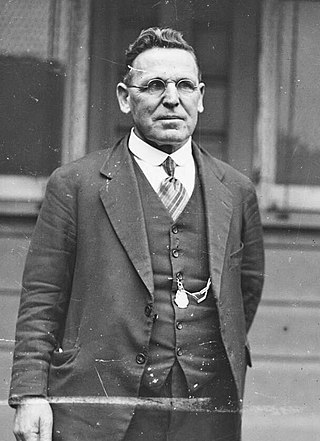Members of the New South Wales Legislative Assembly who served in the 27th parliament of New South Wales held their seats from 1925 to 1927. They were elected at the 1925 state election on 30 May 1925. The Speaker was James Dooley.
Members of the New South Wales Legislative Assembly who served in the 24th parliament of New South Wales held their seats from 1917 to 1920. They were elected at the 1917 state election on 24 March 1917. Speaker was John Cohen until 19 August 1919 when he was succeeded by Daniel Levy.

Lawrence Joseph O'Hara was an Australian politician.

The 1895 Canterbury colonial by-election was held on 11 June 1895 to elect the member for Canterbury in the New South Wales Legislative Assembly, following the resignation of Free Trade Party MP Varney Parkes.

The 1915 Clarence state by-election was held on 14 August 1915 to elect the member for Clarence in the New South Wales Legislative Assembly, following the death of Liberal Reform Party MP John McFarlane.

The 1930 Lane Cove state by-election was held on 26 July 1930 to elect the member for Lane Cove in the New South Wales Legislative Assembly, following the death of Nationalist Party MP Bryce Walmsley.
The 1931 Upper Hunter state by-election was held on 13 June 1931 for the New South Wales Legislative Assembly electorate of Upper Hunter because of the death of William Cameron (Nationalist). The Country Party did not nominate an official candidate because the seat had been held by the Nationalist Party. Malcolm Brown was nominated as an independent country candidate, and was supported in his campaign by the leader of the Country Party, Michael Bruxner.

The December 1911 Cobar state by-election was held on 2 December 1911 to elect the member for Cobar in the New South Wales Legislative Assembly, following the death of Labour Party MP Donald Macdonell.

The 1918 Cobar state by-election was held on 11 May 1918 to elect the member for Cobar in the New South Wales Legislative Assembly, following the death of Labor Party MP Charles Fern.

The 1928 Hamilton state by-election was held on 8 September 1928 to elect the member for Hamilton in the New South Wales Legislative Assembly, following the death of Labor Party MP David Murray.
Paddington, an electoral district of the Legislative Assembly in the Australian state of New South Wales, had two incarnations, from 1859 to 1920 and from 1927 to 1959.
A by-election was held for the New South Wales Legislative Assembly electorate of Paddington on 24 May 1919 because of the resignation of John Osborne (Labor) who had accepted an appointment to the Metropolitan Meat Industry Board. The board was responsible for the control and maintenance of abattoirs, cattle sale yards, meat markets, and slaughterhouses in the greater Sydney region. H. V. Evatt described the appointment as intended to deprive Labor of one of its better political organisers ahead of the 1920 election.

The 1899 Northumberland colonial by-election was held on 20 June 1899 to elect the member for Northumberland in the New South Wales Legislative Assembly, following the death of Protectionist MP Richard Stevenson. The vote was held on the same day as a statewide referendum on the subject of federation, which was an issue throughout the campaign.

The 1896 Waverley colonial by-election was held on 20 February 1896 to elect the member for Waverley in the New South Wales Legislative Assembly, following the death of Free Trade MP Angus Cameron.

The 1898 Sydney-Fitzroy colonial by-election was held on 3 June 1898 to elect the member for Sydney-Fitzroy in the New South Wales Legislative Assembly, following the death of Independent Free Trade MP John McElhone. The vote was held on the same day as a by-election in Narrabri and a statewide referendum on the subject of federation.
A by-election was held for the New South Wales Legislative Assembly electorate of Paddington on 12 January 1888 because William Trickett was appointed to the Legislative Council.

The 2025 Australian federal election will be held on or before 17 May 2025 to elect members of the 48th Parliament of Australia. 150 seats in the House of Representatives and likely 40 of the 76 seats in the Senate will be contested. It is expected that at this election, the Labor government of Prime Minister Anthony Albanese will be seeking re-election to a second term in office, opposed by the Liberal/National Coalition under Leader of the Opposition Peter Dutton, minor parties such as the Greens, and independents.

The 1939 Hawthorn state by-election was held on 10 June 1939 to elect the member for Hawthorn in the Victorian Legislative Assembly, following the death of United Australia Party (UAP) MP John Gray.

The 1945 Prahran state by-election was held on 18 August 1945 to elect the member for Prahran in the Victorian Legislative Assembly, following the death of Liberal Party MP John Ellis. It was held on the same day as a New South Wales state by-election in Blacktown and a federal by-election in Fremantle.

The 1908 Richmond state by-election was held on 2 October 1908 to elect the member for Richmond in the Victorian Legislative Assembly, following the death of United Liberal Party (ULP) MP George Henry Bennett.













